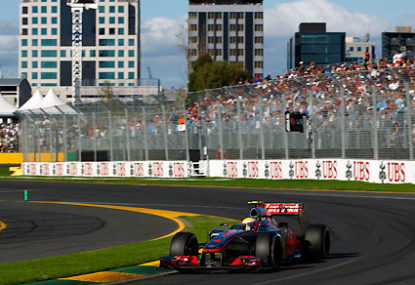Japanese Grand Prix talking points: Verstappen returns to winning ways as Perez solidifies grip on Red Bull seat
Red Bull and Max Verstappen vaulted right back to the top of the charts with a win in Suzuka, after his DNF in Melbourne.

The magic number is 21 – 21°C to be specific, which is the precise temperature in each and every room at the fantastically intricate McLaren Technology Centre.
The MTC has its climate control set just so on the orders of iconic team boss Ron Dennis, who was this week pushed from the CEO chair by the McLaren Technology Group board, hastily ending the era of an Formula One legend.
It was probably about time, too.
There is no overstating Ron Dennis’ success. McLaren, the sport’s second most successful team, achieved all but three of its 20 drivers and constructors world championships under Ron’s stewardship, making him the most successful team principal in the history of Formula One – better than Williams, better than Chapman, and better than even Enzo Ferrari.
McLaren as a company, too, has become a technological leader in the broader motorsport world and beyond. McLaren Applied Technologies in particular in particular is involved in a seemingly limitless number of industries worldwide since it was devised by Dennis in 1991.
In this way Dennis’s McLaren was among the first Formula One entities to recognise the benefits of competing in the sport extended beyond racing and even motoring, making the operation self-sufficient in a way the likes of, for example, Sauber is only today coming to terms with.
It’s an undoubtedly impressive legacy, but it’s one rooted in the past.
“I am disappointed that the representatives of TAG and Mumtalakat, the other main shareholders in McLaren, have forced through this decision to place me on gardening leave,” Ron Dennis’ statement said. “The grounds they have stated are entirely spurious; my management style is the same as it has always been.”
Unfortunately for Dennis it seems more of the same won’t cut it for a once-great Formula One team starved of success.
After ceding the top job to nominated successor Martin Whitmarsh at the beginning of the 2009 season, Dennis swept back to power in a coup at the beginning of 2014 that deposed Whitmarsh in the process. Dennis was the man, or so he said at the time, to return the team to glory after five years without a drivers championship and 15 seasons without a constructors title.
The then 66-year-old set himself typically ambitious targets, including managing the team’s imminent partnership with Honda by restructuring the racing division and rebuilding the team’s portfolio of sponsors to fund its future.
On both counts he has struggled.
The team’s difficulties with Honda have been well publicised, including and especially its high-profile spat with now former Japanese engine boss Yasuhisa Arai, who McLaren attempted to have sacked in just the first year of their partnership.
On the commercial side the team has slipped further into arrears, so much so that Manor’s drivers’ overalls have looked better decorated than those worn by Fernando Alonso and Jenson Button.
Dennis has been unable to replace title sponsor Vodafone, and a slew of sponsors have abandoned the team on his watch, including imminently departing two-decade-old sponsor ExxonMobil.
Instead of reinvigorating the team by inserting himself back into the picture, even if not as team principal, Dennis’s expectations and exacting micro-management directorial style has created an additional burden.
But it isn’t just down to Ron Dennis – rather, Dennis’s forced exit is a sign of the changing times in Formula One.
Long gone are the days of a single man helming a Formula One team. In 2016 an Formula One operation is simply too vast to be wielded by a single person, as an increasing number of teams and even Formula One Management are realising.
Mercedes is a prime example of the team’s owner, in this case Dieter Zetsche, taking a hands-off approach and leaving management of the team to a split directorship comprising Toto Wolff and Paddy Lowe.
Ferrari, inversely, has done the opposite, and it is mired in managerial struggle.
Incoming commercial rights holder Liberty Media, too, is rumoured to be considering a similarly split set-up, with the prospect of Ross Brawn managing Formula One’s sporting affairs alongside Bernie Ecclestone in the commercial hot seat a possibility.
Ron Dennis’s ill-fated comeback only proved just how much Formula One has evolved since he first took the McLaren reins in 1981. While no-one doubts his business acumen, the reality is that McLaren, as a Formula One team, is too big For Ron Dennis.
Now without him the team has a chance to breathe – and breathe something other than exactly 21-degree air.
Follow @MichaelLamonato on Twitter